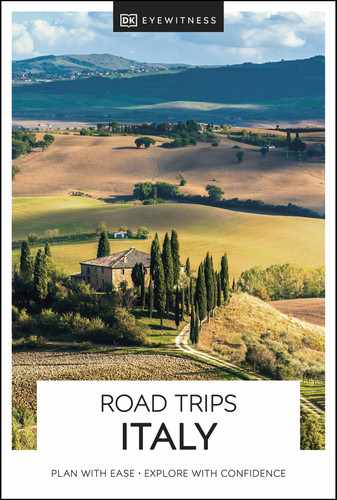g Contents
Practical Information
Italy is easy and safe to travel around. The country has an excellent health system, and emergency infrastructure and other public services operate smoothly and efficiently. Broadband and mobile phone accessibility is almost universal, and, while banks in smaller towns may keep seemingly erratic hours, most have an ATM outside. Despite this, a little know-how goes a long way. Be prepared for all eventualities by considering the following points before you travel.
Passports and Visas
European Union (EU) nationals and citizens can enter Italy and stay indefinitely with a valid passport or identity card.
Citizens of the UK, US, Canada, Australia and New Zealand can stay in Italy for up to three months on production of a passport, but will need to apply for a visa at their local Italian embassy in advance if they wish to stay longer. It is not sufficient for non-EU citizens wanting to stay for longer than three months to simply cross the border into another EU country once their three-month time limit is up. All other foreign nationals need a visa.

British passports
Government Advice
Now more than ever, it is important to consult both your and the Italian government’s advice before travelling. The UK Foreign and Commonwealth Office, the US State Department, the Australian Department of Foreign Affairs and the Italian Ministero della Salute offer the latest information on security, health and local regulations.
Travel Insurance
A travel insurance policy will usually cover you for loss or theft of luggage and other property such as passports and money, as well as for personal accident, repatriation in case of severe illness, third-party damage and delayed or cancelled flights. For a premium you can even insure against cancelling the holiday yourself. You will need to take out special cover for taking part in sports and any activities considered hazardous. Most insurance policies also include covering legal costs, up to a specified amount, as do comprehensive motor policies.

Pedestrian road crossing
Health
Italy has a world-class healthcare system. UK citizens are eligible for free emergency medical care in Italy provided they have a valid European Health Insurance Card (EHIC) or UK Global Health Insurance Card (GHIC). Australia has a reciprocal health care agreement with Italy and citizens can access essential medical treatment as long as they are registered to Medicare. If you have an EHIC card, be sure to present this as soon as possible. You may have to pay after treatment and reclaim the money later.
For visitors from outside the EU and Australia, payment of medical expenses is the patient’s responsibility. It is important to arrange comprehensive medical insurance. In holiday areas there may be a guardia medica, a kind of minor ailments and emergencies clinic designed to deal with the sort of accidents that befall tourists. All non-residents will be asked to pay a flat fee, usually around €15–20. And whatever kind of doctor you see, prescriptions must also be paid for upfront (unless you are staying in Italy for some time and want to register with the local health authority or ASL).
If you do register with the local health authority, you will need a codice fiscale, a tax identification number, without which it is impossible to do anything in Italy (they are allocated at birth). You can apply for one by taking your passport to the local Agenzia delle Entrate. If you are lucky, the procedure can be completed in a morning, but unless you are staying in Italy for an extensive period, it is not worthwhile. If you are taking prescription medicines, it is a good idea to bring the packet with you in case you run out. Many pharmacists will sell you a replacement for drugs such as anti-inflammatories, antibiotics and those for blood pressure etc, without requiring a prescription. Pharmacies are signalled by a green cross, and if the one you go to is closed, there should be a notice telling you where to find the nearest open pharmacy.
If you are involved in an accident call 118 or go to the Pronto Soccorso (casualty department) of the nearest hospital. If you are in a major town or city, it may be possible to find an English-speaking doctor, or, at least, someone who can translate for you.
No inoculations are required for Italy, but mosquito repellent may be useful in the summer.
Italy’s seas have seen an increase in jellyfish over the past few years. None are particularly dangerous, but a sting is painful, and can leave weals on the skin for days. To relieve the pain and swelling, either buy an ammonia stick to paint on the sting, or look out for natural remedies.

Pharmacy signs are lit up at night to show where to buy medicine

An unusual pharmacy sign

A public ambulance
Personal Security
Italy is relatively safe to visit, but you should still take precautions. Bag-snatching scooter drivers are a problem in some cities, so hold bags on the inside of the pavement, especially in crowded tourist areas. Pickpockets are common on public transport and in city centres, so keep your belongings in a safe place or with you at all times.
If you have anything stolen, report the crime within 24 hours to the nearest police station and carry your ID. To make an insurance claim, get a copy of the crime report (denuncia). Contact your embassy if you have your passport stolen, or in the event of a serious crime or accident.
Italians are very accepting of all people, regardless of race, gender or sexuality. Homosexuality was legalized in 1887 and in 1982, Italy became the third country to recognize the right to legally change your gender. If you do feel unsafe, the Safe Space Alliance pinpoints your nearest place of refuge.
Women may receive unwanted attention, especially around tourist areas. If you feel threatened, head straight for the nearest police station.
Unless you speak good Italian, it is better to report a crime in person, rather than phoning. If you are going to claim for stolen goods on your insurance, you will need a crime report. There are two crime-fighting forces in Italy. The Carabinieri, the military branch, have stations in just about every village; the civil police, Polizia Statale, have a station known as the Questura in most sizeable towns. Either can furnish you with a crime report, but English is not always spoken.
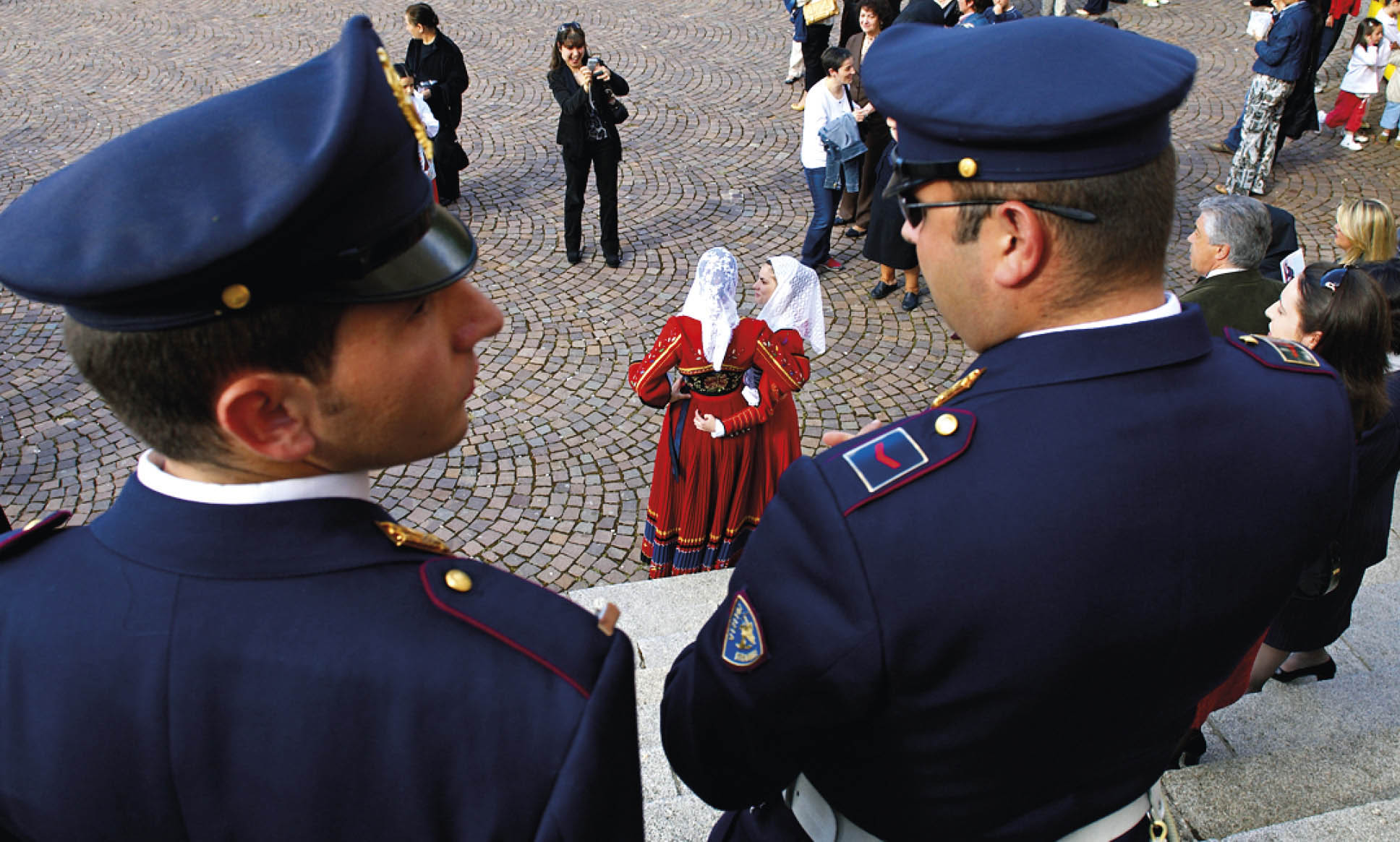
The Carabinieri police deal with a variety of offences
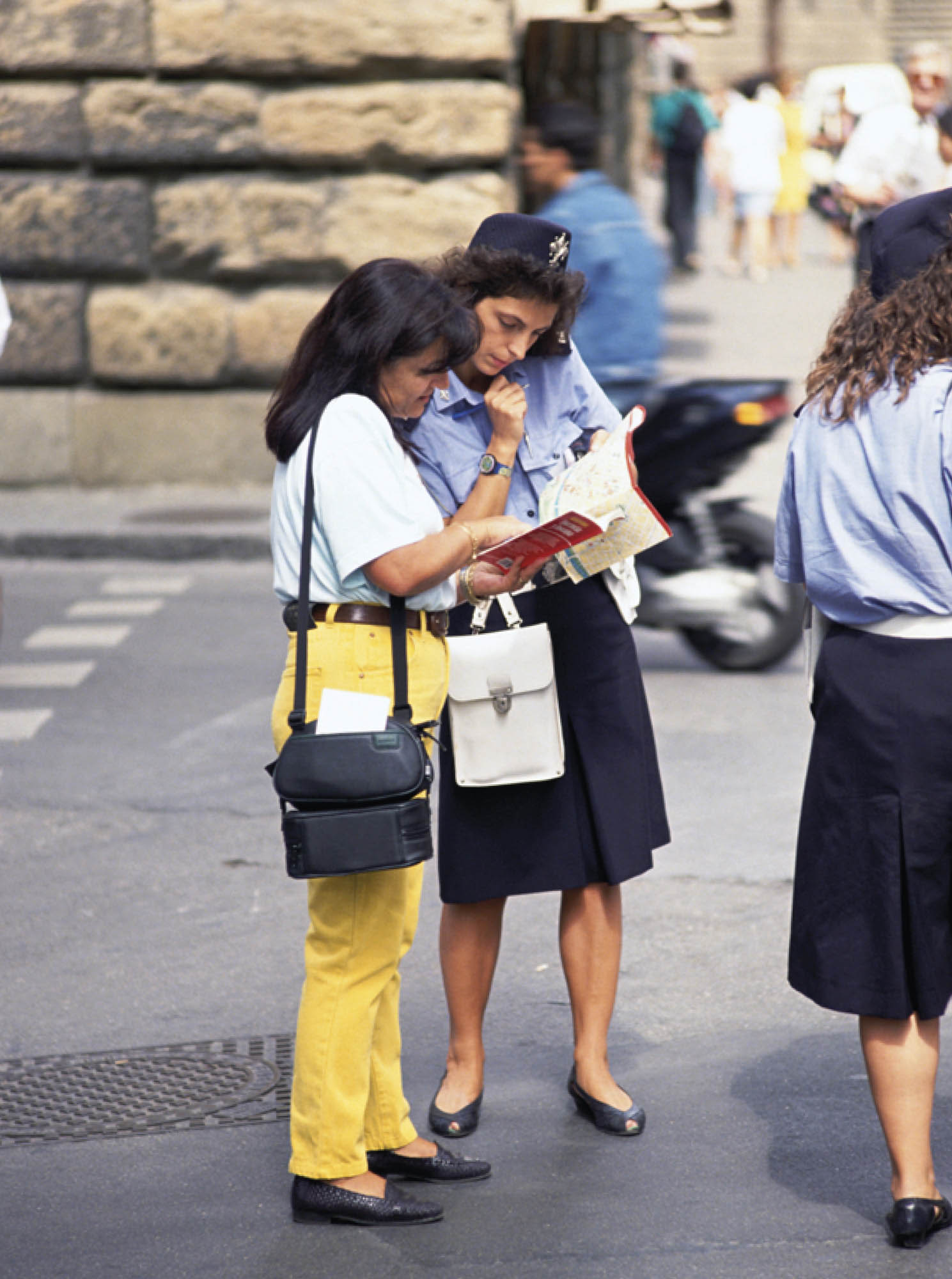
Police women help with directions
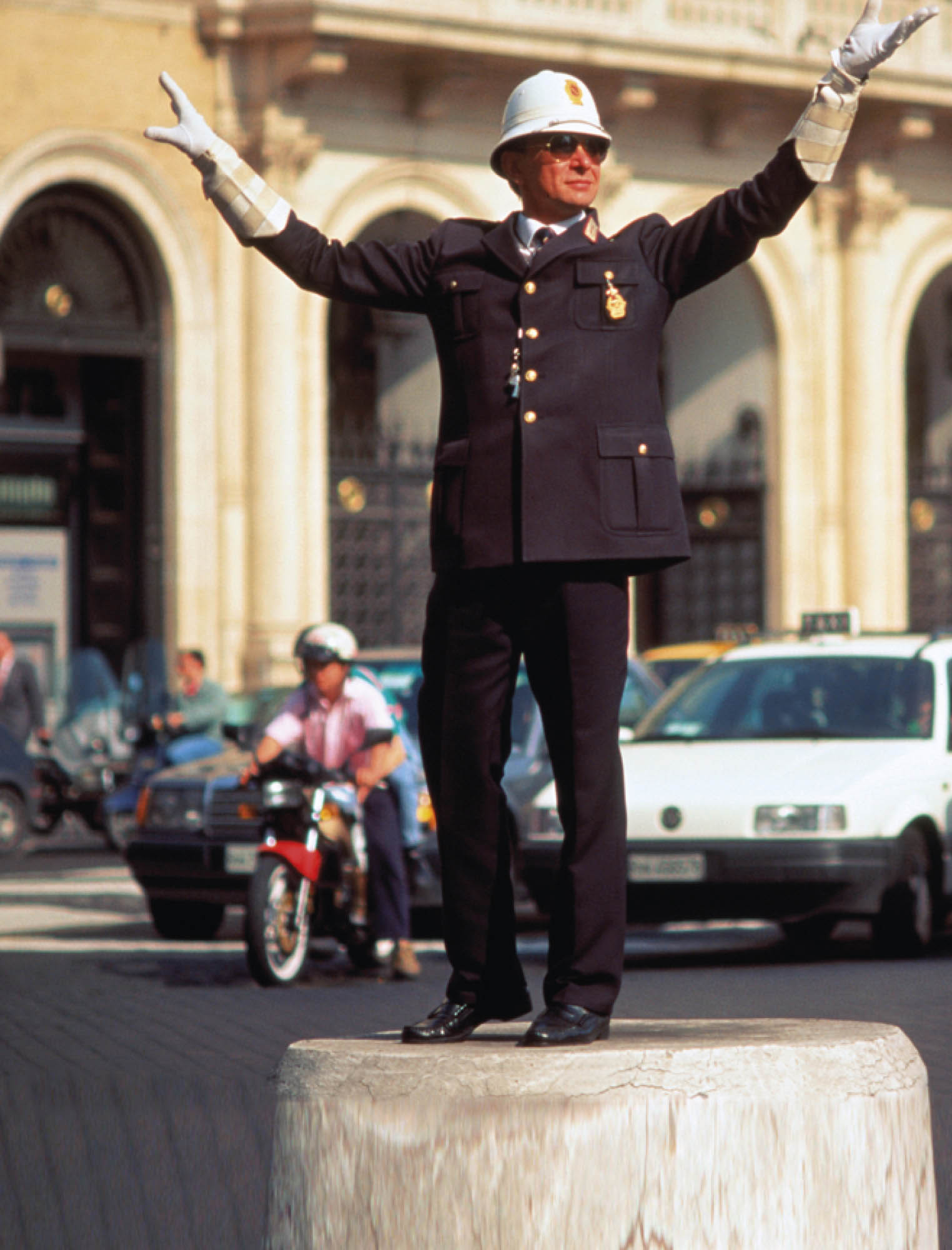
Police officer directs traffic
Practical Information | CONTENTS
DIRECTORY
Government Advice
Australian Department of Foreign Affairs and Trade
Ministero della Salute
UK Foreign and Commonwealth Office
www.gov.uk/foreign-travel-advice
US State Department
www.travel.state.gov
health
EHIC
Information for travellers
GHIC
ghic.org.uk
Medicare Australia
Information for individuals and families
Personal Security
Safe Space Alliance
Mobile Phones and Wi-Fi
Wi-Fi is generally widely available throughout Italy, and cafés and restaurants will usually give you the password for their Wi-Fi on the condition that you make a purchase. For security reasons, you may be required to register before going online from a com-puter other than your own, whether in an internet café or the hotel in which you are staying.
EU visitors to Italy can use their devices without any roaming charges. Users will be charged the same rates for data, SMS and voice calls as they would pay at home.
Visitors from other countries should bear in mind that security measures mean that unless you have a codice fiscale (tax ID number) you will not be able to activate an Italian SIM card. If you do have a codice fiscale, it is worth considering buying an Italian SIM card when you arrive in the country. These can cost as little as five euros, and can be recharged in amounts of €10, €20, €30 or €50 either at tabacchi (tobacconists) advertising a SISAL terminal (also used for registering lottery numbers). The main phone operators in Italy are TIM, Vodafone, Wind and 3. In Italy the regional phone code is an integral part of every number, and always has to be dialled. Unusually, if calling Italy from abroad, the initial zero has to be retained.
Post
The Italian postal system, Poste Italiane, is somewhat erratic. It can be marvellously efficient, but also appallingly slow at times. If something is urgent, avoid sending it registered, as registered mail tends to be amassed at the collection point before being sent on – use the postal system’s courier service, Postacelere, or, for international deliveries, Paccocelere Internazionale. The latter is cheaper and more widely available outside major cities than international operators such as DHL, UPS and Fedex (although the service is not offered by every post office). Stamps (francobolli) are on sale at post offices, tobacconists and often at many shops that sell postcards. The Vatican City and San Marino have their own post systems and stamps. Only letters bearing San Marino or Vatican stamps can be posted in San Marino and Vatican postboxes.
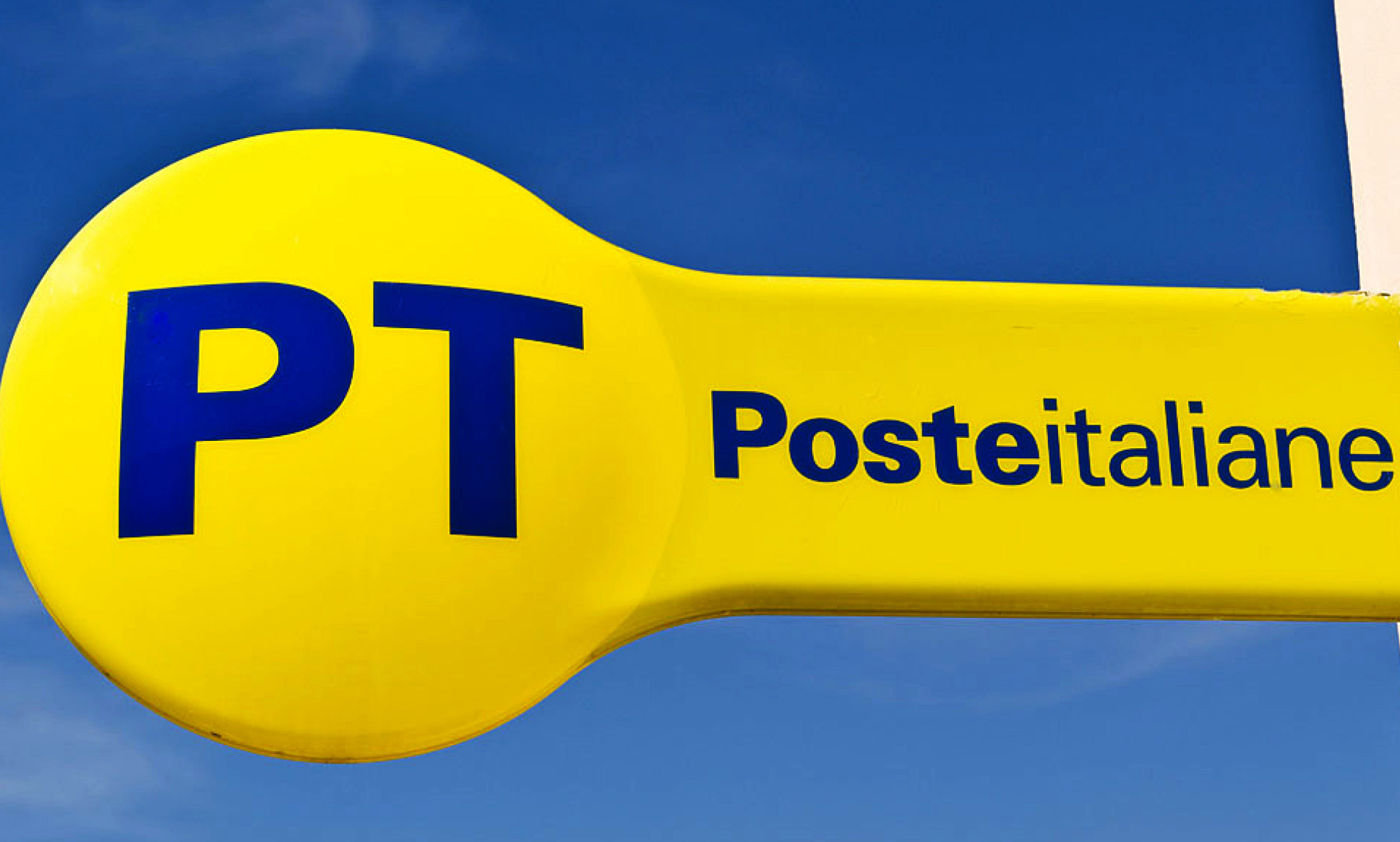
Sign for a post office

An Italian postbox
Banks and Money
Italy is one of the many European countries using the euro. Most establishments accept major credit, debit and pre-paid currency cards. Contactless payments are becoming increasingly common in Italy, but it’s always a good idea to carry some cash for smaller items such as coffee, gelato and pizza-by-the-slice, and when visiting markets or remote areas. Cash is also needed for ticket machines at stations and when tipping. Wait staff should be tipped €1–2 and hotel porters and housekeeping will expect €1 per bag or day.
The easiest way of getting cash is with a debit or credit card from an ATM machine (Bancomat). Most cards have a maximum withdrawal amount per day (typically €250). It is essential to inform your bank that you will be using your card abroad, as many banks have introduced increased security measures.
Many banks charge high rates for withdrawals and transactions made abroad (typically 2.5 per cent), and in the case of credit cards, interest is charged from the date of withdrawal.
Banking hours in Italy are restrictive so it’s safest to acquire some local currency before arriving in Italy. If you want to take cash euros, you might get a better rate of exchange by using online currency operators.

An ATM or Bancomat machine

Regional bank of the Südtirol

One of Italy’s many banks
Tourist Information
Most Italian towns have a tourist information office, which can provide town maps, advice on accommodation, and information on regional recreational and cultural activities. Before you leave for Italy, you can get information from the Italian State Tourism Board.

Sign for a tourist information office
Opening Hours
Shops are usually open Monday to Saturday 9am–1pm and 4–7pm, but many close on Saturday afternoons and Monday mornings. Most archaeological sites, museums and galleries are closed on Mondays.
Opening hours for state-run museums and most private ones are generally Tuesday to Saturday 9am until 1 or 2pm, and then for several hours in the afternoon, from any time between 3:30 and 5pm until 6–8pm, depending on the season. Sunday opening times are generally from 9am until 1pm. Many large museums now open throughout the day year round, and have late-night openings in summer (till 10pm or later Tue–Sat, or 8pm Sun). Most archaeological sites open every day, often including Sunday, from 9am until late evening – often one hour before sunset.
Practical Information | CONTENTS
COVID-19 The pandemic continues to affect Italy. Some museums, tourist attractions and hospitality venues are operating on reduced or temporary opening hours, and require visitors to make advance bookings for a specific date and time. Always check ahead before visiting.
Travellers with Specific Requirements
Italy’s historic towns and cities are ill-equipped for disabled access. Many buildings do not have wheelchair access or lifts. Always call ahead to ensure that your needs will be met. AIAS and Rome and Italy, in addition to MilanoPerTutti in Milan, provide information and general assistance for dis-abled travellers.
Language
Italian is the official language, but there are also many regional languages spoken, such as Friulian, Piedmontese, Sardinian and Sicilian.
The level of English and other foreign languages spoken can be limited, particularly in rural areas, and locals appreciate visitors’ efforts to speak Italian, even if only a few words.
Time and Electricity
Italy uses Central European Time (CET), which is one hour ahead of Greenwich Mean Time (GMT). Summer (Daylight Saving) Time comes into effect from 2am on the last Sunday of March, and ceases at 2am on the last Sunday in October.
Italian voltage is 220v. Plugs have either two (not earthed) or three round pins (which means they may be earthed, but not necessarily so).

People relaxing at a café
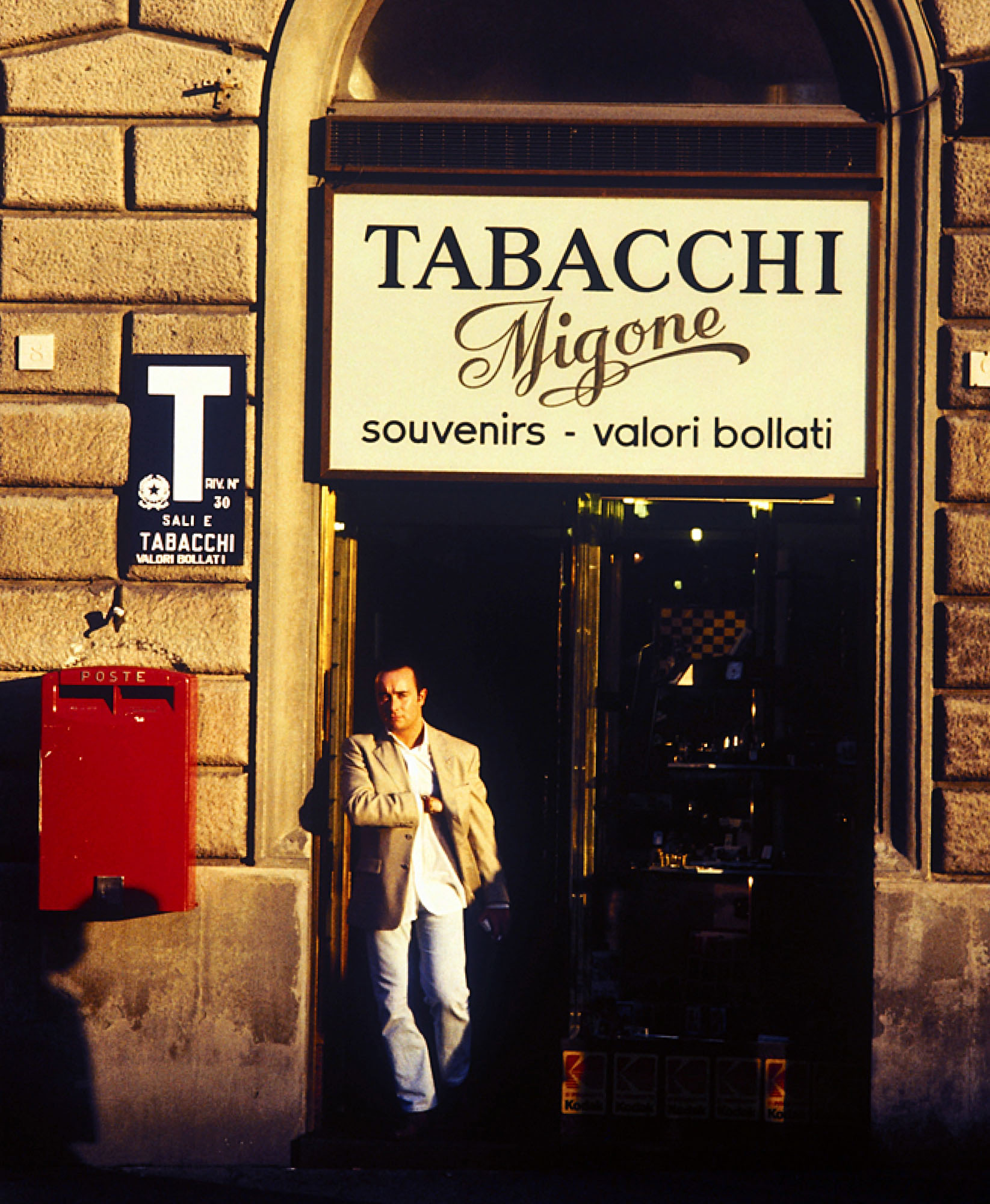
A tobacconist’s, selling stamps, and phone cards
Practical Information | CONTENTS
DIRECTORY
Communications
Directory Enquiries
1240
International Directory Enquiries
170
Operator Services
170 (also for reverse charge and calling card calls)
Italy Country Code
+39
Calling Abroad from Italy
00 followed by the country code:
UK +44, Ireland +353, USA +1, New Zealand +64, Australia +61
Post
DHL
199 199 345;
Fedex
0180 6111 800;
Poste Italiane
UPS
02 3030 3039;
Tourist information
Italian State Tourism Board
Travellers with Specific Requirements
AIAS
Rome and Italy
MilanoPerTutti
